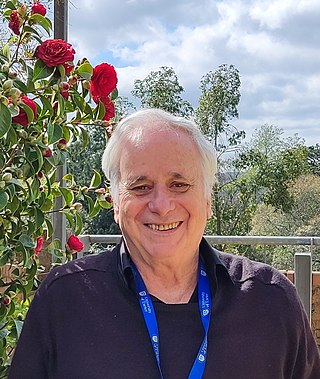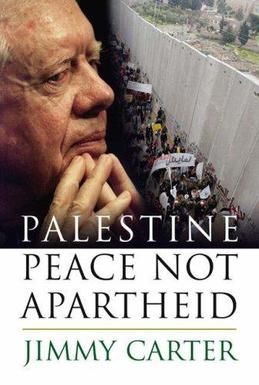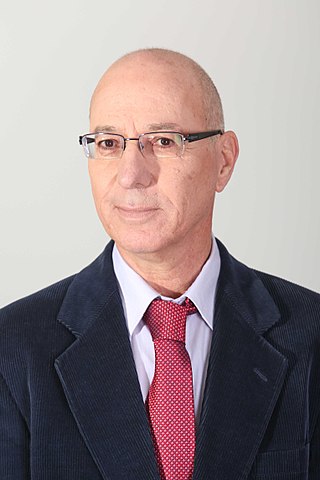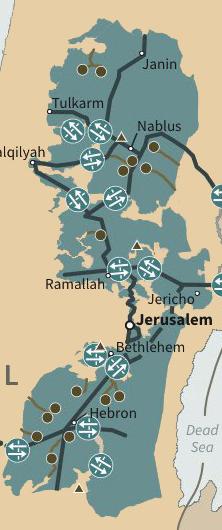Related Research Articles

Zionism is a nationalist movement that emerged in the 19th century to espouse support for the establishment of a homeland for the Jewish people in Palestine, a region roughly corresponding to the Land of Israel in Jewish tradition. Following the establishment of Israel, Zionism became an ideology that supports "the development and protection of the State of Israel".

The Israeli–Palestinian conflict is one of the world's most enduring conflicts, beginning in the mid-20th century. Various attempts have been made to resolve the conflict as part of the Israeli–Palestinian peace process, alongside other efforts to resolve the broader Arab–Israeli conflict. Public declarations of claims to a Jewish homeland in Palestine, including the First Zionist Congress of 1897 and the Balfour Declaration of 1917, created early tensions in the region after waves of Jewish immigration. Following World War I, the Mandate for Palestine included a binding obligation for the "establishment in Palestine of a national home for the Jewish people". Tensions grew into open sectarian conflict between Jews and Arabs. The 1947 United Nations Partition Plan for Palestine was never implemented and provoked the 1947–1949 Palestine War. The current Israeli-Palestinian status quo began following Israeli military occupation of the West Bank and Gaza in the 1967 Six-Day War, known as the Palestinian territories.

Sari Nusseibeh is a Palestinian professor of philosophy and former president of the Al-Quds University in Jerusalem. Until December 2002, he was the representative of the Palestinian National Authority in that city. In 2008, in an open online poll, Nusseibeh was voted the 24th most influential intellectual in the world on the list of Top 100 Public Intellectuals by Prospect Magazine (UK) and Foreign Policy.

Palestine, officially the State of Palestine, is a state located in the Southern Levant region of West Asia. Officially governed by the Palestine Liberation Organization (PLO), it claims the West Bank and the Gaza Strip as its territory, though the entirety of that territory has been under Israeli occupation since the 1967 Six-Day War. As a result of the Oslo Accords of 1993–1995, the West Bank is currently divided into 165 Palestinian enclaves that are under partial Palestinian National Authority (PNA) rule; the remainder, including 200 Israeli settlements, is under full Israeli control. The Gaza Strip has been ruled by the militant Islamic group Hamas and has been subject to a long-term blockade by Egypt and Israel since 2007.

Ilan Pappé is an expatriate Israeli historian and political scientist. He is a professor with the College of Social Sciences and International Studies at the University of Exeter in the United Kingdom, director of the university's European Centre for Palestine Studies, and co-director of the Exeter Centre for Ethno-Political Studies.
Mark Andrew LeVine is an American historian, musician, writer, and professor. He is a professor of history at the University of California, Irvine.

Israel's policies and actions in its ongoing occupation of the Palestinian territories have drawn accusations that it is committing the crime of apartheid. Leading Palestinian, Israeli and international human rights groups have said that the totality and severity of the human rights violations against the Palestinian population in the occupied territories, and by some in Israel proper, amount to the crime against humanity of apartheid. Israel and some of its Western allies have rejected the accusation, with the former often labeling the charge antisemitic.

The book Palestine: Peace Not Apartheid by former president Jimmy Carter has been highly controversial and attracted a wide range of commentary. The reception of the book has itself raised further controversy, occasioning Carter's own subsequent responses to such criticism.

Leila Farsakh is a Palestinian political economist who was born in Jordan and is an Associate Professor of Political Science at University of Massachusetts Boston. Her area of expertise is Middle East Politics, Comparative Politics, and the Politics of the Arab-Israeli Conflict. Farsakh holds a MPhil from the University of Cambridge, UK (1990) and a PhD from the University of London (2003).
Ella Shohat, is a professor of cultural studies at New York University, where she teaches in the departments of Art & Public Policy and Middle Eastern & Islamic Studies. She has written and lectured on the topics of Eurocentrism, Orientalism, Postcolonialism, Transnationalism, and Diasporic cultures.
This is an incomplete bibliography of the Arab–Israeli conflict.

Edward Wadie Said was a Palestinian American academic, literary critic and political activist. A professor of literature at Columbia University he was among the founders of postcolonial studies. Born in Mandatory Palestine, he was a citizen of the United States by way of his father, a U.S. Army veteran.
Nur ad-Din Masalha commonly known in English as Nur Masalha is a Palestinian writer, historian, and academic.

In 1948 more than 700,000 Palestinian Arabs – about half of prewar Palestine's Arab population – were expelled or fled from their homes by Zionist militias, during the 1948 Palestine war. The exodus was a central component of the fracturing, dispossession and displacement of Palestinian society, known as the Nakba, in which between 400 and 600 Palestinian villages were destroyed, village wells were poisoned in a biological warfare programme to prevent Palestinians returning, and other sites subject to Hebraization of Palestinian place names, and also refers to the wider period of war itself and the subsequent oppression up to the present day.

Yitzhak Reiter is an Israeli political scientist who is full professor of Islamic, Middle East and Israel Studies serving as the Head of Research Authority and Chair of Israel Studies at Ashkelon Academic College. He is also a senior researcher at both the Jerusalem Institute for Policy Research and the Harry S. Truman Institute for Peace Research of the Hebrew University of Jerusalem as well as Editor-In-Chief of Israel Academic Press.

Virginia Tilley is an American political scientist specialising in the comparative study of ethnic and racial conflict. She is Professor of Political Science at Southern Illinois University-Carbondale in the US.
Racism in the Palestinian territories encompasses all forms and manifestations of racism experienced in the Palestinian Territories, of the West Bank, Gaza, and East Jerusalem, irrespective of the religion, colour, creed, or ethnic origin of the perpetrator and victim, or their citizenship, residency, or visitor status. It may refer to Jewish settler attitudes regarding Palestinians as well as Palestinian attitudes to Jews and the settlement enterprise undertaken in their name.

Boycott, Divestment and Sanctions (BDS) is a Palestinian-led movement promoting boycotts, divestments, and economic sanctions against Israel. Its objective is to pressure Israel to meet what the BDS movement describes as Israel's obligations under international law, defined as withdrawal from the occupied territories, removal of the separation barrier in the West Bank, full equality for Arab-Palestinian citizens of Israel, and "respecting, protecting, and promoting the rights of Palestinian refugees to return to their homes and properties". The movement is organized and coordinated by the Palestinian BDS National Committee.
Uriel "Uri" Davis is an academic and civil rights activist. Davis has served as Vice-Chairman of the Israeli League for Human and Civil Rights and as lecturer in Peace Studies at the University of Bradford. Davis describes himself as "a Palestinian Hebrew national of Jewish origin, anti-Zionist, registered as Muslim and a citizen of an apartheid state - the State of Israel." A member of Fatah since 1984, he was elected to the Revolutionary Council for the Palestinian party in 2009.

The Palestinian enclaves are areas in the West Bank designated for Palestinians under a variety of U.S. and Israeli-led proposals to end the Israeli–Palestinian conflict. The enclaves are often compared to the nominally self-governing black homelands created in apartheid-era South Africa, and are thus referred to as bantustans. They have been referred to figuratively as the Palestinian archipelago, among other terms.
References
- ↑ Jurisprudence of jurisdiction By Shaun McVeigh. Routledge, 2007. ISBN 978-1-84472-032-3 p. viii
- 1 2 Zionism and Apartheid: The Analogy in the Politics of International Law Archived 2010-07-06 at the Wayback Machine . Engage Journal, Issue 2 - May 2006
- ↑ Palestine: the pursuit of justice, John Strawson and Rosemary Bechler, 2 March 2008. OpenDemocracy
- ↑ , "John Strawson - Staff Bio". Archived from the original on 27 December 2010.
- ↑ , "Encountering Islamic Law".
- ↑ John Strawson Archived 2010-12-27 at the Wayback Machine , University of East London